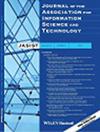Success, a structured search strategy: Rationale, principles, and implications
Journal of the American Society for Information Science and Technology
Pub Date : 2000-11-01
DOI:10.1002/1097-4571(2000)9999:9999%3C::AID-ASI1034%3E3.0.CO;2-2
引用次数: 43
Abstract
This study aimed at reevaluating the Success search strategy. It was conducted by in-depth interviews with 15 professional information searchers in a three-round Delphi-type research. The panelists were asked to critically analyze the rationale of structured searching that forms the theoretical basis of the Success strategy, and evaluate its key principles and guidelines. Success is a strategy for structured searching. Its rationale is based on the argument that information searching is a sequence of interrelated actions aimed at accomplishing the search assignment. Every action determines the course of the searching, and thus affects its final result. The searcher's reasoning emerges as a key to the success of the searching process. Consequently, it is essential to adopt structured search strategies that are based on rational search procedures and techniques. The Success strategy is grounded in the principle of planning the search according to five basic successive phases, namely assignment, resources, words, method, and evaluation, and seven generic guidelines: (1) define the assignment, (2) locate resources, (3) choose search words, (4) select methodology, (5) execute the search, (6) evaluate the results, and (7) if necessary, repeat the search by refining previous decisions.成功,一个结构化的搜索策略:基本原理,原则和含义
本研究旨在重新评估成功搜索策略。通过对15名专业信息搜索者的深度访谈,进行了三轮德尔菲式调查。小组成员被要求批判性地分析构成成功战略理论基础的结构化搜索的基本原理,并评估其关键原则和指导方针。成功是结构化搜索的策略。它的基本原理是基于这样一种观点,即信息搜索是一系列旨在完成搜索任务的相互关联的行动。每个操作都决定了搜索的过程,从而影响最终结果。搜索者的推理是搜索过程成功的关键。因此,必须采用基于合理搜索程序和技术的结构化搜索策略。成功策略的基础是根据五个基本的连续阶段,即任务、资源、词汇、方法和评估,以及七个通用准则来规划搜索,(1)定义任务,(2)定位资源,(3)选择搜索词,(4)选择方法,(5)执行搜索,(6)评估结果,(7)如有必要,通过改进先前的决策来重复搜索。
本文章由计算机程序翻译,如有差异,请以英文原文为准。
求助全文
约1分钟内获得全文
求助全文
来源期刊
自引率
0.00%
发文量
0
审稿时长
3.5 months

 求助内容:
求助内容: 应助结果提醒方式:
应助结果提醒方式:


